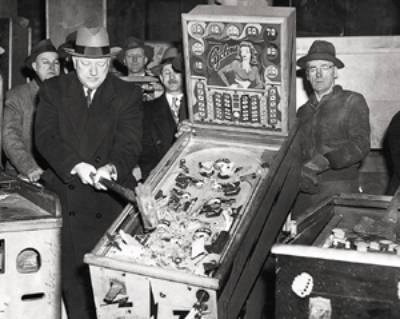Slaying the Silver Ball

Fiorello LaGuardia was elected mayor of New York City in 1933, and, on January 1 of the following year, took office. One of his first acts as mayor was to crack down on mafia activity, especially mob-owned slot machines, seeing them as a direct line into the coffers of organized crime. LaGuardia paid personal attention to the confiscation and destruction of the machines, taking a sledgehammer along with the media in tow to snap pictures.
But with this one income source down, the mafia was not about to give up on gambling altogether. As Mental Floss magazine noted, the mobsters turned to something else: pinball machines. LaGuardia’s ire refocused on pinball as well.
LaGuardia was already anything but fond of pinball; according to Popular Mechanics, he stated in an affidavit submitted to the Supreme Court that pinball hit the “pockets of schoolchildren in the form of nickels and dimes given them as lunch money.” And he was probably correct. Pinball operators were known to allow players to exchange the replays and extra balls they earned for cash. This effectively turned the machines into complicated slot machines, especially in cases where these bonuses were awarded randomly, and not due to player skill. Over time, he succeeded in getting the game declared an illegal game of chance, and in 1940, New York City banned pinball within its borders. Like most contraband, this simply pushed pinball underground, into seedy parlors and strip joints in Greenwich Village and Harlem. Popular disdain for pinball did not approach that for slot machines, making it hard for LaGuardia to muster up support for raids on illegal pinball establishments—until December 1941.
That year, the Japanese attacked Pearl Harbor, thrusting the United States into World War II. In January 1942, the Federal government established the “Salvage for Victory” campaign, calling on Americans to turn in scrap metal to be used in the war effort. As reported by The New York Times, LaGuardia and the team went on a hunt for pinball machines to further these efforts. By February, they confiscated (and again, sledgehammered) more than 3,000 machines, turning roughly 2,500 of them into one ton of metal for the war. The pinball ban in New York lasted for decades, outliving LaGuardia (who died in 1947).
Music may have been the driving force behind the reintroduction of pinball into New York and other cities. In 1969, The Who released the album Tommy, which told the story of a “deaf, dumb, and blind kid” who became a superstar pinball player despite his apparent disabilities. The album hit number four on the Billboard pop charts and the song “Pinball Wizard” peaked at number nineteen on the U.S. Billboard charts that year. In 1975, Tommy was adapted as a film, further reinvigorating demand and interest in pinball.
In 1976, New York City reinstated pinball—but perhaps only due to a stroke of luck. Roger Sharpe, a magazine editor in his mid-twenties, testified in front of the city council that pinball was a game of skill, not luck, and therefore shouldn’t be regulated as a game of chance. The city council required more convincing.
So Sharpe took to the machine, pulled back the plunger, and told the council members that he’d skillfully drop the ball into the middle slot, in what he’d later admit was a bluff. The ball went exactly where he said it would, and the council voted to allow pinball back into the city.
Bonus Fact: Another thing LaGuardia banned in the name of fighting the mob? Artichoke sales. In December 1935, LaGuardia announced what, according to The New York Times, he called a “serious and threatening emergency”: The price of artichokes had greatly inflated due to price fixing by the mafia. LaGuardia barred the sale, display, and even possession of artichokes. Amazingly, this worked. When prices came down a year later, LaGuardia rescinded the order.
From the Archives: The Last Pinball Machine Company: I originally wrote this in 2010, so I have no idea if it’s still true, but it’s interesting.
Take the Quiz: Name all the lyrics to “Pinball Wizard.”
Related: Tommy, by The Who. If you don’t know why this is related, that’s really upsetting. And you probably didn’t do well on the quiz, either.
